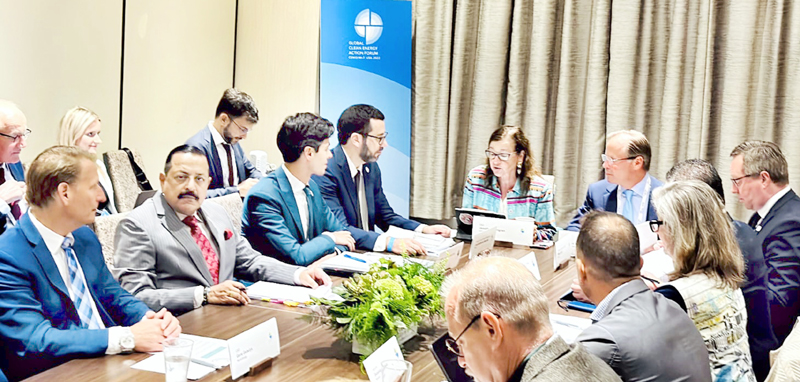
Excelsior Correspondent
PITTSBURGH, Sept 23: India’s Science and Technology Minister, Dr Jitendra Singh, who is leading a high-level Joint Ministerial Delegation of S&T and Ministry of Power, New & Renewable Energy today said that decarbonizing of cities and buildings should be the highest priority for the public and private sectors and it needs to be done at scale, pace, and by using an integrated and digitalized approach to bring systemic efficiency.
In his address at the Roundtable on “Net Zero Built Environment with Connected Communities” at Global Clean Energy Action Forum-2022 at Pittsburgh, in the United States, Dr Jitendra Singh said, we cannot solve climate change without transforming our cities and buildings and this requires massive efforts from the private and public sectors, but it is possible with today’s technologies.
Dr Jitendra Singh pointed out that increasingly, cooling is recognized as a developmental need that is linked with achieving many Sustainable Development Goals. He said, Demonstration and Deployment, investment, technology are the key challenges to achieve net zero connected communities at a global level.
Dr Jitendra Singh pointed out that the development of a robust R&D innovation ecosystem will, inter alia, involve further development of scientific manpower in the area, requisite academic and R&D institutional capacities, support for R&D activities on various facets of cooling, including but not limited to refrigerants, cooling equipment, passive building design interventions, not-in-kind technologies and new emerging technologies; and industry preparedness to assimilate new technologies.
Dr Jitendra Singh informed the Ministers and Delegates that his Ministry of Science and Technology has actively engaged several industry players, especially for demonstration and deployment and today we have over 78 industries participating in the Building Energy Efficiency and Smart Grid Program.
The Minister, however, acknowledged that the decarbonization of cities is a multifaceted challenge and requires a holistic approach and systemic efficiency. He said, alongside buildings, the electrification of private and public transport plays a pivotal role in not only achieving net zero emission targets, but also improving urban air quality. The public and Private sectors need to work closely to ensure the implementation of research outcomes, the Minister added.
Dr Jitendra Singh said that three major actions for which public and private sectors can come together to achieve planning and demonstrations of net zero connected communities are- Catalyzing effective capital reallocation and new financing structures, including through scaling up climate finance, Lowering technology costs with R&D, nurturing industrial ecosystems, collaborating across value chains to reduce cost, and Establishing compensating mechanisms to address socioeconomic impacts, through economic diversification programs, reskilling and redeployment programs.

